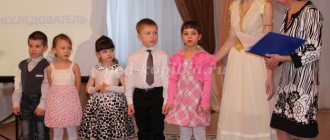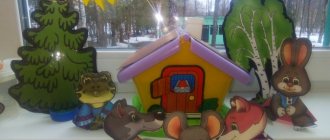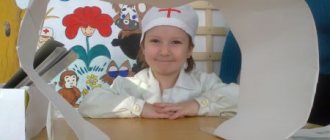Where and how can seminars and workshops take place?
Seminars can be used as an effective means of training the teaching staff of a preschool institution and as a way to develop the creative abilities of employees. They can be held at a variety of levels - starting from the preschool educational institution itself and ending with large meetings at the district, regional or national level.
Typically, seminars held in kindergartens deal with more specific current topics or are related to the implementation of theory into practice, in particular, new legal requirements. If we are talking about seminars organized by specialized enterprises, then they may concern broader issues, for example, the socialization of students from different social strata of society or the psychological relief of preschool employees.
In some cases, you can take seminars for kindergarten teachers for free. On the Internet you can find sites with useful publications in this area, which can be used by teachers and kindergarten teachers as a basis for self-education and self-development.
Regulations on holding the All-Russian Distance Pedagogical Conference
Dear Colleagues!
The Einstein Center for the Growth of Talented Children and Teachers (Mass Media Registration Certificate EL No. FS 77 - 69923, registered by the Federal Service for Supervision of Communications, Information Technologies and Mass Communications, ROSKOMNADZOR, Moscow) invites you to take part in the XI All-Russian Distance Pedagogical conference “Pedagogy and psychology in the modern world: innovative methods of teaching and education in the context of current challenges of our time” .
Publishing the results of their own theoretical and practical research is an excellent opportunity for teachers to present their materials for discussion by colleagues and experts, receiving a qualified, friendly assessment of the result of their work.
All authors of papers submitted to the Conference receive
All-Russian distance pedagogical conference. Based on the results of the Conference, it will be published.
The Conference certificate contains a note on the editorial review of materials (required for certification), as well as the topic of the published report. Participation in a pedagogical conference helps to gain additional points in the certification.
| Dates: August 1, 2022 – December 31, 2022 ATTENTION! ACCEPTANCE OF APPLICATIONS EXTENDED UNTIL JANUARY 15! Acceptance of works: 24 hours a day, 7 days a week. Participants: teachers of preschool educational institutions (educators, educational psychologists, speech therapists, speech pathologists, etc.); teachers of general educational institutions (schools, gymnasiums, lyceums, etc.); teachers of primary, secondary and higher education institutions (schools, technical schools, colleges, higher educational institutions); teachers of additional education institutions. Registration fee for participation: 110 rubles (one report is provided for the Conference, which is published in an electronic collection, the participant receives a certificate of participant-speaker of the Conference). Preparation of a conference participant certificate: daily, the next day after sending the application for participation in the Conference and paying the registration fee (section RESULTS after 19-00 Moscow time). | ORDERING FEE FOR 1 REPORT 110 rub. apply | |
| How to take part in the conference: Step 1: Submit an electronic application for participation in the All-Russian Pedagogical Conference, attaching your report (article) to the application. Step 2: Pay the registration fee for participation in the amount of 110 rubles when creating an application for the Conference or on the PAYMENT page in any way convenient for you. Step 3: Within 24 hours, the report (article) undergoes editorial review. The participant is included in the list of registered participants of the XI All-Russian Distance Pedagogical Conference “Pedagogy and Psychology in the Modern World: Innovative Methods of Teaching and Education in the Context of Current Challenges of Our Time.” Step 4: The next day after sending the application for participation in the Conference and payment of the registration fee, it will be sent to your email. Step 5: After January 1, 2022, download an electronic collection of articles from the Conference participants from the Conference page. | ||
| Sample certificate of participant-speaker of the XI All-Russian Distance Pedagogical Conference “Pedagogy and Psychology in the Modern World: Innovative Methods of Teaching and Education in the Context of Current Challenges of Our Time” The following information is included in the Conference participant certificate: - unique registration number of the certificate; — theme of the All-Russian Distance Pedagogical Conference; — Full name, position, name of the educational institution of the Conference participant; — topic of the Conference participant’s report; — date of the Conference; — information on the registration of the mass media of the TsRTDP “Einstein” in Roskomnadzor; — official seal and signature of the editor-in-chief of the Einstein CRDP. | ||
COMPLETED CONFERENCES
X All-Russian Distance Pedagogical Conference “Training and Education 2022: Implementation of Educational and Professional Standards in Modern Conditions”
List of registered participants
Regulations on the X All-Russian Distance Pedagogical Conference “Training and Education 2021: Implementation of Educational and Professional Standards in Modern Conditions”
IX All-Russian Distance Pedagogical Conference “Training and Education 2022: Implementation of Educational and Professional Standards in Modern Conditions”
List of registered participants
Regulations on the IX All-Russian Distance Pedagogical Conference “Training and Education 2020: Implementation of Educational and Professional Standards in Modern Conditions”
VIII All-Russian Distance Pedagogical Conference “Teacher of the 21st Century: Innovative Methods and Traditional Approaches in the Modernization of Russian Education”
List of registered participants
Regulations on the VIII All-Russian Distance Pedagogical Conference “Teacher of the 21st Century: Innovative Methods and Traditional Approaches in the Conditions of Modernization of Russian Education”
VII All-Russian Distance Pedagogical Conference “Modern education and upbringing in the context of the implementation of the Federal State Educational Standard: traditions, experience, innovations”
List of registered participants
Regulations on the VII All-Russian Distance Pedagogical Conference “Modern education and upbringing in the context of the implementation of the Federal State Educational Standard: traditions, experience, innovations”
VI All-Russian distance pedagogical conference “Teacher of the XXI century: innovative methods and traditional approaches in the context of the implementation of the Federal State Educational Standard”
List of registered participants
Regulations on the VI All-Russian Distance Pedagogical Conference “Teacher of the 21st Century: Innovative Methods and Traditional Approaches in the Context of the Implementation of the Federal State Educational Standard”
V All-Russian distance pedagogical conference “Teacher of the XXI century: innovative methods and traditional approaches in the context of the implementation of the Federal State Educational Standard”
List of registered participants
Regulations on the V All-Russian Distance Pedagogical Conference “Teacher of the 21st Century: Innovative Methods and Traditional Approaches in the Context of the Implementation of the Federal State Educational Standard”
IV All-Russian distance pedagogical conference “Teacher of the 21st century: innovative methods and traditional approaches in the context of modernization of Russian education”
List of registered participants
Regulations on the IV All-Russian Distance Pedagogical Conference “Teacher of the 21st Century: Innovative Methods and Traditional Approaches in the Modernization of Russian Education”
III All-Russian distance pedagogical conference “Modern education and upbringing: traditions and innovations”
List of registered participants
Regulations on the III All-Russian Distance Pedagogical Conference “Modern Education and Upbringing: Traditions and Innovations”
II All-Russian distance pedagogical conference “Modern education and upbringing: problems, approaches, solutions”
List of registered participants
Regulations on the II All-Russian Distance Pedagogical Conference “Modern education and upbringing: problems, approaches, solutions”
I All-Russian Distance Pedagogical Conference “Teacher of the 21st Century: Modern Approaches to Teaching and Education”
List of registered participants
Regulations on the holding of the I All-Russian Distance Pedagogical Conference “Teacher of the 21st Century: Modern Approaches to Teaching and Education”
My family traditions
Parent conference at the preschool educational institution.
One of the tasks of our kindergarten is to promote the development and strengthening of the family as a social institution by involving parents in cooperation and participation in raising children.
Tasks:
- promote the observance of existing family traditions and the emergence of new ones;
promote the exchange of experience in family education and traditions;- improve the pedagogical culture of parents;
- look for new forms of interaction between teachers and parents.
Materials and equipment:
A4 sheet with a family tree, pencils, scissors, silhouette of a lamb made of cardboard, glue pencil, woolen threads, napkins; musical accompaniment; threads and ribbons for games, prizes for each child; scarves for the game "Yurt".
Progress of the event
(Families are invited to the music room; each family has a separate table.)
Leading:
Dear parents! Today we have gathered to talk about family, family traditions and their importance in the upbringing and development of a preschool child. Before starting our conversation, I offer you a warm-up “What do we know about the family.”
What is the Latin word for "family". (Surname.)
Now say “family” in Italian. (Mafia.)
As you know, the Greek goddess Athena was the goddess of wisdom, and the owl was considered her bird. But the goddess Hera, the wife of Zeus, was considered the patroness of family and motherhood. Guess which bird was considered the “bird of Hera”? (Stork.)
What is the Russian “fruit” proverb about someone who has inherited bad, unseemly behavior from their father or mother? ("The apple never falls far from the tree".)
What Russian toy is this quote from the encyclopedia about: “It personifies the idea of a strong family, prosperity, procreation, and carries the idea of unity”? (About the nesting doll.)
Leading:
Dear parents!
How do you calculate who has the leading role in raising a child – the family or the kindergarten? (Answers from parents.)
The priority in raising a child undoubtedly belongs to the family.
What do you think the word “family” means? (Answers.)
For a long time, home and family have always been spoken of with love and respect. Legends, fairy tales, proverbs and sayings about family have come down to us from ancient times. Let's try to remember them.
Being a guest is good, but being at home is better).
The hut is not red in its corners, but... (red in its pies).
As it is at home, so is it... (yourself).
Children are not a burden, but... (a joy).
When the family is together and... (heart in the right place).
Leading:
The moral health of a family, its spiritual values and, consequently, its potential educational capabilities can be judged by the traditions established in it. I invite you to answer the questions now.
What do you think is included in the concept of “family traditions”?
What family traditions do you have in your family?
Do family traditions influence the upbringing of a child?
What positive character traits do they foster in a child? (Parents' answers.)
Leading:
So let's look at our traditions. One of the traditions of every family is celebrating a birthday.
child.
And what is a holiday without a gift and surprise? Now we propose to play the “Choose a Gift” game. ( A rope is stretched across the room and gifts wrapped in paper are hung on it. The child’s eyes are closed, untwisted, and he must cut off some gift with scissors.)
Presenter:
Another tradition is compiling a family tree.
We suggest now compiling a pedigree for your family. Start with your children. (Leaflets with a picture of a family tree are distributed, and the participants in the parent conference write down their pedigree, time to complete the task is 5 minutes.)
Presenter:
Who had the most numerous clan? Do you know where your parents and grandparents are from? Who came up with the name you have?
Leading:
Look, our hall is decorated with photographs from family albums. Unfortunately, in the modern computer world, this tradition is receding more and more into the background. But, however, the selection of photographs, the design of album pages is exactly the communication that a child needs in his joint activities with his parents. In addition, memorial certificates and documents about achievements can be placed in the album - a family archive.
Leading:
Another good tradition is playing with your child. Play is a child’s life, not preparation for life. There are a lot of games and toys. You should carefully and thoughtfully approach their selection.
Role-playing game:
the main type of games for preschoolers. During this game, the child tries on various social roles, puts himself in social situations that he could see in the real life of adults.
Outdoor games:
Children are very active and restless, which is why outdoor games are so important. In them, children can realize their need for movement, improve their motor skills and abilities, and develop such physical qualities as speed, agility, and strength.
Folk games:
help maintain cultural traditions and connections between generations. We invite you to play with us one of the Bashkir folk games “Yurt”.
The game involves four subgroups of children, each of which forms a circle at the corners of the site. In the center of each circle there is a chair on which a scarf with a national pattern is hung. Holding hands, everyone walks in four circles at alternating steps and sings:
We are funny guys
Let's all gather in a circle,
Let's play and dance
And let's rush to the meadow.
At the end of the music, they quickly run to their chairs, take a scarf and pull it over their heads in the form of a tent (roof), it turns out to be a yurt. The first group of children to build a yurt wins.
Leading:
Family meals are also a wonderful tradition.
You can communicate at the table on any topic - discuss news, events of the day. The benefits of family dinners together are enormous. Firstly, it is helping children acquire language. Secondly, such family dinners provide a sense of family cohesion. And, of course, a family dinner is an occasion for your favorite dishes! Now each family will share their signature dishes. (Discussion.)
And we also have our own tradition - to end any event with tea. And today we will not violate it. After all, our parents prepared sweet dishes.
Gulnara Gaffanova, teacher, Liliya Fayzullina, teacher,
Olga Nikiforova, senior teacher
MBDOU D/s No. 59 Salavat rep. Bashkortostan





